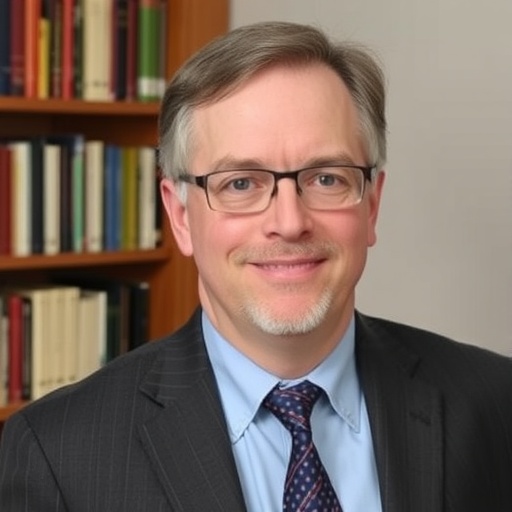Brian Wirth, the esteemed Head of the Nuclear Engineering Department at the University of Tennessee, Knoxville, has been elected as a 2025 Fellow of the American Physical Society (APS), an honor that recognizes his groundbreaking contributions to plasma physics and nuclear engineering. Wirth’s election to this prestigious fellowship reflects his pioneering work in understanding the complex interactions between plasma and metallic surfaces, particularly involving helium behavior within plasma-facing materials—a fundamental challenge in advancing fusion energy technology.
Dr. Wirth holds the distinguished position of UT-ORNL Governor’s Chair Professor of Computational Nuclear Engineering, where his research seamlessly merges high-performance computational modeling with experimental validation. His seminal studies have elucidated plasma-surface interactions in fusion reactors, providing insights into how helium ions, generated by plasma, permeate and damage metallic components exposed to extreme environments. These materials must endure intense neutron fluxes and thermal stresses while maintaining structural integrity over time, a necessity for the sustainability and efficiency of future fusion power plants.
The recognition stems from Wirth’s extensive leadership and academic excellence highlighted by the APS Division of Plasma Physics (DPP). His efforts have not only advanced scientific understanding but have also fostered significant community engagement and service in physics. The APS, a robust organization representing over 50,000 members globally, exemplifies the highest standards in physics research and education, making this accolade a testament to Wirth’s impact within the international scientific community.
Wirth emphasized the collaborative nature of his success, attributing it to the strong network of talented students and the robust research ecosystem cultivated at the University of Tennessee. He underscored the university’s commitment to research excellence in fusion technology, nuclear materials, and extreme environment engineering, positioning it as a premier institution for scientific inquiry and discovery in these domains. This environment fosters innovation in computational and experimental techniques critical to addressing the multifaceted challenges in nuclear engineering.
His research portfolio is centered on the performance evaluation of nuclear fuels, structural materials, and plasma components under the demanding conditions of nuclear fission and fusion reactors. By integrating computational material science with experimental observation, Wirth’s approach systematically deciphers radiation damage mechanisms, helium bubble formation, and surface degradation, all of which are vital to predicting material lifespan and reactor safety. These insights directly inform the design and development of more resilient materials capable of withstanding the harsh environments within nuclear reactors.
A major highlight of Wirth’s career includes leading a landmark project funded by the Department of Energy’s Office of Science under the Scientific Discovery through Advanced Computing (SciDAC) program from 2012 to 2024. This initiative focused on producing high-fidelity simulation tools that enable precise modeling of plasma-surface interactions in fusion environments. The project has culminated in numerous scholarly publications and advanced the training of multiple PhD candidates, thereby fortifying the next generation’s expertise in computational nuclear engineering.
In addition to his research accomplishments, Wirth has played a pivotal role in shaping the trajectory of U.S. fusion energy research by chairing the 2024 Fusion Energy Sciences Advisory Committee sub-committee. Under his guidance, this committee provided critical recommendations to the DOE concerning future fusion facilities that would maximize scientific discovery and technological innovation over the next decade, ensuring that the United States remains at the forefront of fusion research on the global stage.
Before joining the University of Tennessee faculty in 2010, Wirth contributed to academic and national laboratory research endeavors as a faculty member at the University of California, Berkeley, and as a materials scientist at Lawrence Livermore National Laboratory. These experiences enriched his multidisciplinary expertise and equipped him to tackle the complex challenges inherent in nuclear materials science and reactor engineering.
Wirth’s recognition by the APS will be formally acknowledged at the annual APS Division of Plasma Physics meeting from November 17 to 21 in Long Beach, California, where he will receive a certificate of recognition. This event gathers leading physicists and researchers, providing a platform to showcase advancements in plasma physics and fusion science, further amplifying the significance of Wirth’s achievements within this dynamic community.
This honor not only celebrates individual scientific excellence but also highlights the critical role of computational methods in addressing contemporary engineering problems in nuclear science. Wirth’s work epitomizes the synergy between theory, simulation, and experiment that drives progress in understanding the fundamental interactions governing plasma-material interfaces—a linchpin in realizing practical and sustainable fusion energy.
Wirth’s trajectory underscores the importance of dedicated institutional support, interdisciplinary collaboration, and the nurturing of scientific talent, which collectively propel breakthroughs in fields essential to addressing global energy challenges. His fellowship serves as a beacon for aspiring scientists and engineers committed to fostering innovation in nuclear engineering and plasma physics.
Brian Wirth’s election as an APS Fellow is a significant milestone that reinforces the University of Tennessee’s stature as a hub for cutting-edge research in nuclear engineering, fusion technology, and computational physics. His contributions will continue to influence material design strategies and fusion facility development, thereby accelerating the transition toward clean and abundant energy solutions.
Subject of Research: Plasma-surface interactions, helium behavior in metallic plasma-facing components, nuclear fuels and materials performance under fusion and fission environments, computational nuclear engineering.
Article Title: Brian Wirth Elected 2025 Fellow of the American Physical Society for Seminal Advances in Fusion Plasma-Surface Interaction Research
News Publication Date: Not specified
Web References:
University of Tennessee Nuclear Engineering Department: https://ne.utk.edu/people/brian-d-wirth/
American Physical Society: https://www.aps.org/
Image Credits: University of Tennessee
Keywords
Nuclear engineering, Plasma physics, Structural engineering, Nuclear fission, Nuclear fusion
Tags: American Physical Society FellowBrian Wirthcommunity engagement in physicscomputational nuclear engineering innovationsfusion energy technology challengeshelium behavior in fusion materialsleadership in plasma physicsneutron flux effects on materialsnuclear engineering advancementsplasma physics contributionsplasma-surface interactions researchstructural integrity in fusion reactors





